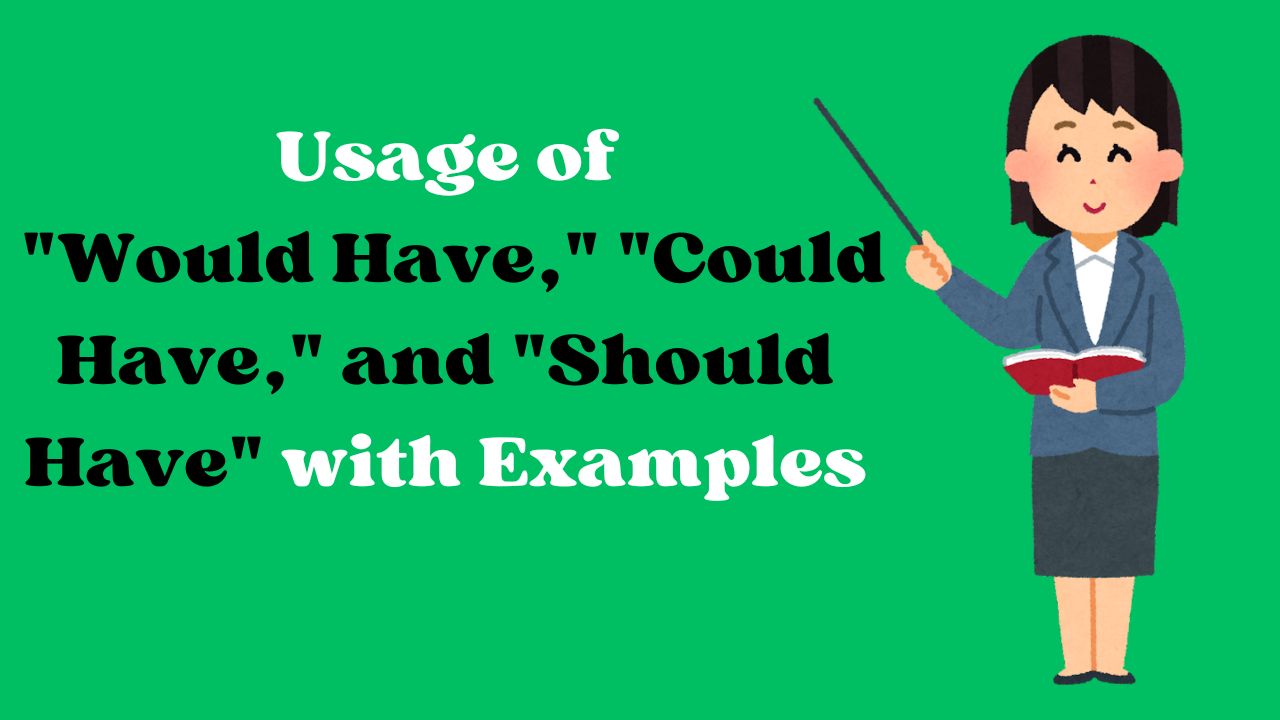The phrases “would have,” “could have,” and “should have” are often used to describe hypothetical situations, regrets, or possibilities in the past. Let’s break them down with their rules and uses.
Would Have (होगा / होता)
Positive Form Usage
Use: Used to describe what might have happened or what someone intended to do in the past, but it didn’t actually happen.
Structure:
Examples of Would Have in Positive form
I would have gone to the party if I had time.
अगर मेरे पास समय होता, तो मैं पार्टी में जाता।
She would have called you, but she lost her phone.
वह तुम्हें कॉल करती, लेकिन उसका फोन खो गया।
They would have won the match if they played well.
अगर उन्होंने अच्छा खेला होता, तो वे मैच जीत जाते।
Negative Form Usage
Use: To express that something was not likely to happen or didn’t happen.
Structure:
Examples of Would Have in Negative form
I would not have gone if I knew the truth.
अगर मुझे सच्चाई पता होती, तो मैं नहीं जाता।
She would not have left without saying goodbye.
वह बिना अलविदा कहे नहीं जाती।
❓ Interrogative Form Usage
Use: To ask about a hypothetical past action.
Structure:
Examples of Would Have in Interrogative form
Would you have helped me if I asked?
क्या तुम मेरी मदद करते अगर मैंने पूछा होता?
Would she have accepted the offer?
क्या उसने ऑफर स्वीकार किया होता?
Could Have (सकता था / सकती थी)
Positive Form Usage
Use: Used to express a possibility or ability that existed in the past but the action was not taken.
Structure:
Examples of Could Have in Postive Form
You could have helped me with the project.
तुम मेरी प्रोजेक्ट में मदद कर सकते थे।
She could have scored better if she studied more.
अगर उसने ज्यादा पढ़ाई की होती, तो वह बेहतर स्कोर कर सकती थी।
We could have gone for a walk, but it started raining.
हम टहलने जा सकते थे, लेकिन बारिश शुरू हो गई।
Negative Form Usage
Use: To express that something was impossible or didn’t happen despite the possibility.
Structure:
Example of Could Have in Negative Form
He could not have finished the work alone.
वह अकेले काम खत्म नहीं कर सकता था।
They could not have won without teamwork.
वे बिना टीमवर्क के नहीं जीत सकते थे।
❓ Interrogative Form Usage
Use: To ask if something was possible in the past.
Structure:
Example of Could Have in Interrogative Form
Could we have avoided the accident?
क्या हम एक्सीडेंट टाल सकते थे?
Could she have called earlier?
क्या उसने पहले कॉल कर सकती थी?
Should Have (चाहिए था / चाहिए थी)
Positive Form Usage
Use: Used to express regret, criticism, or an obligation in the past. It indicates something that ought to have happened but did not.
Structure:
Examples of Should Have in Positive form
You should have apologized earlier.
तुम्हें पहले माफी मांगनी चाहिए थी।
They should have completed the assignment on time.
उन्हें समय पर असाइनमेंट पूरा करना चाहिए था।
I should have called my parents yesterday.
मुझे कल अपने माता-पिता को फोन करना चाहिए था।
Negative Form Usage
Use: To express regret or to criticize a past action that was not necessary.
Structure:
Examples of Should Have in Negative form
You should not have lied to your parents.
तुम्हें अपने माता-पिता से झूठ नहीं बोलना चाहिए था।
He should not have wasted so much time.
उसे इतना समय बर्बाद नहीं करना चाहिए था।
❓ Interrogative Form Usage
Use: To ask about the rightness of an action in the past.
Structure:
Examples of Should Have in Interrogative Form
Should I have apologized sooner?
क्या मुझे पहले माफी मांगनी चाहिए थी?
Should we have left earlier?
क्या हमें पहले निकल जाना चाहिए था?
Summary of Usage
Positive Form usage Of Would have, Could have, and Should have
| Phrase | Use Case | Example in English | Example in Hindi |
| Would Have | Hypothetical situation in the past | I would have helped if I was there. | अगर मैं वहां होता, तो मैं मदद करता। |
| Could Have | Missed opportunity or past ability | She could have won the race. | वह रेस जीत सकती थी। |
| Should Have | Regret or past obligation | He should have studied harder. | उसे और मेहनत से पढ़ाई करनी चाहिए थी। |
Negative Form usage Of Would have, Could have, and Should have
| Phrase | Use Case | Example in English | Example in Hindi |
| Would Not Have | Hypothetical situation that didn’t happen | I would not have gone if I knew the truth. | अगर मुझे सच्चाई पता होती, तो मैं नहीं जाता। |
| Could Not Have | Past impossibility or inability | He could not have finished the task alone. | वह अकेले काम खत्म नहीं कर सकता था। |
| Should Not Have | Regret or criticism for a wrong action | You should not have lied to your parents. | तुम्हें अपने माता-पिता से झूठ नहीं बोलना चाहिए था। |
Interrogative Form usage Of Would have, Could have, and Should have
| Phrase | Use Case | Example in English | Example in Hindi |
| Would Have | Asking about a hypothetical past action | Would you have helped me if I asked? | क्या तुम मेरी मदद करते अगर मैंने पूछा होता? |
| Could Have | Asking if something was possible in the past | Could we have avoided the accident? | क्या हम एक्सीडेंट टाल सकते थे? |
| Should Have | Asking about the correctness of a past action | Should I have apologized sooner? | क्या मुझे पहले माफी मांगनी चाहिए थी? |

